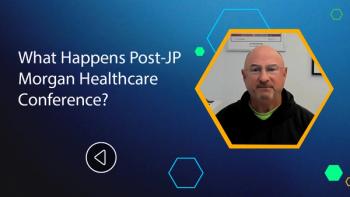
Long-Term Implications of Ongoing Drug Shortages
Scott Brunner, CEO, and Tenille Davis, Chief Advocacy Officer, of the Alliance for Pharmacy Compounding explore the potential long-term implications of the ongoing drug shortages for the healthcare system and patient care.
Scott Brunner, CEO, and Tenille Davis, Chief Advocacy Officer, of the Alliance for Pharmacy Compounding discuss the challenges faced by patients and healthcare providers due to drug shortages, particularly for semaglutide and other medications. It highlighted the role of compounding pharmacies in addressing these shortages and the importance of distinguishing legitimate compounding pharmacies from illicit actors. The conversation also emphasized the need for collaboration between pharmaceutical manufacturers, healthcare providers, and regulatory agencies to improve the drug supply chain and ensure patient access to essential medications.
What are the potential long-term implications of the ongoing drug shortages for the healthcare system and patient care?
Scott Brunner: If I had to answer to that, I would be a rich man. Because I think, I think everybody, everybody's asking that question right now. I mean, the current spotlight is on GLP one drugs. There are an awful lot of drugs on that drug shortage list where prescribers’ hospitals are having to figure out, oh, I can't get this drug. What's the alternative for this patient? In some instances, there is an alternative. In other instances, there is not.
We have a serious supply chain crisis when it comes to prescription drugs in this country, and I know congress and policy makers and regulators and many are working on that, but I do want to note that sometimes there are issues more important than GLP one drugs. We had a meeting this week with FDA officials who had reached out to us to ask how traditional compounding pharmacies might be able to assist in this shortage that is developing with IV fluids. And the Baxter plant in North Carolina was flooded severely damaged by Hurricane Helene. We have another facility in Daytona Beach, Florida. That was in the path of Milton. Haven't heard yet about damage to that, but they are providing north of 60 or 70% of the IV fluid bags that hospitals use around the country.
It's an extraordinary number, and when you knock out that much production, hospitals are growing frantic as they look for providers of those, I believe there is absolutely a role for 503, the outsourcing facilities, in helping meet that need in this interim period until those facilities can come back to production. I also think locally and on a smaller scale, there is a place for sterile compounding pharmacies to be able to work with a local hospital to meet the need 503 As are not going to be able to achieve the scale that many of these health systems need for those IV bags, but for smaller local hospitals, they can absolutely take some of the burden off in supplying that need. And so, we're working with FDA now to create, you know, what is the framework that would allow 503, a pharmacy, traditional compounding pharmacies, to do this. It's going to require special temporary guidance from FDA. It will require the ability of the compounding pharmacy to source the bags themselves that may have to do with some importation issues. So, we're working with FDA on that right now, but it's just one example of a really serious and urgent shortage where there is a role for compounding to play.
Again, FDA approved drugs, the gold standard, when the FDA approved drug is not available, then a drug prepared by a 503B outsourcing facility is appropriate. It takes time for a 503B outsourcing facility to ramp up production of a shortage drug. And so, there are often gaps there where we believe 503As within some very restrictive guardrails can help meet that need and save patients’ lives. We saw that happen during the pandemic.
There were 13 essential medications for treating covid patients that hospitals needed and could not get. The manufacturer could not provide them. The 503B outsourcing facilities had not yet ramped up production of those. There's awful lot of testing that 503B's have to do before they can begin to produce the drug. And so, there was a gap around the country. There were about 80 traditional compounding pharmacies that worked with local hospitals to prepare those sterile drugs and source them to the hospital. It's very unusual. FDA had to provide temporary guidance in order to allow it, but it absolutely saved patients’ lives. And so that's what, that's what compounding exists in part for.
Tenille Davis: The only clarification point is traditional compounding pharmacies, 503a pharmacies are only allowed to dispense pursuant to a patient specific prescription, so they can't distribute compounded medications, say, to a hospital or a clinic in typical circumstances, and that's why during this covid area drug shortage, and why with IV fluids, there would need to be some sort of special regulatory exception made to allow them, because someone's in that's in the hospital that needs IV fluids, there's not, there's not typically time for a prescription to be then sent to the pharmacy, for the pharmacy for the pharmacy to then fill the prescription and send it back to the hospital. So, hospital needs to have those things on hand and available to use for patients that urgently need them, and that's why this kind of special FDA emergency rules kind of have to exist in those circumstances.
Newsletter
Lead with insight with the Pharmaceutical Executive newsletter, featuring strategic analysis, leadership trends, and market intelligence for biopharma decision-makers.




